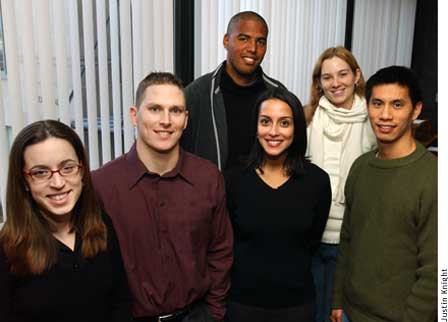Students contribute to counterterrorism efforts
Ever since Professor Philip Heymann ’60 began teaching a class on terrorism in the winter of 1988, it’s drawn a crowd. “I think then it was because it was a sort of sexy subject and had a little history and political science about it,” he said. In the post-9/11 world, although the class is more popular than ever, Heymann’s approach has changed. “It’s now very oriented toward what do you do, what can be done, what’s fair to do,” he said. “That’s my interest, but it’s also what students want.”
Heymann has taken this practical approach even further. Supervised by Professor David Rosenberg and Heymann, four students are providing research and analysis to the Department of Justice’s Counterterrorism section–in the school’s first clinical placement with the unit.
Rosenberg first arranged for students to assist the department on a volunteer basis. Last spring, Beth Stewart ’05 was among those who gave their time, working on jury instructions for statutes used in the prosecution of international terrorists. Not only was it a learning experience, says Stewart, but considering how overloaded the department seemed to be, she felt it was her patriotic duty. “I believe the war on terror is the most important challenge facing our country,” she said. “I was excited to be able to leverage my legal skills to help.”
Students are also working on problems related to terrorism in a new seminar Heymann and Rosenberg began offering last year. The idea, Heymann says, was to put them to work on policy papers looking at what the rules should be for practices used to fight terrorism, such as detention without criminal charges, coercive interrogation or data mining. Heymann has passed on some of the students’ findings to members of Congress and several government agencies.
Dana Carver Boehm ’05, who attended the class, said it was exhilarating to be applying law to real-world situations. A former CIA intern whose father worked for the agency, Boehm, like many in the seminar, came to law school with an interest in national security issues. She wrote a policy paper on transparency in coercive interrogation practices that are legal under international treaties, as distinguished from torture. How much, she asked, should the public be told about techniques and results? She concluded that the use of coercive techniques should be revealed but not necessarily the information they yield. “I was looking at balancing national security with the democratic value of accountability,” said Boehm. “I think it’s important to understand that the two aren’t mutually exclusive.”
In addition to policy papers, the seminar produced heated debate. Brock Taylor ’05 says he came away with a greater appreciation for the balance Boehm describes, but he still believes the threat of terrorism tips the scales. “It’s more important to protect people’s lives,” he said. “Civil liberties become meaningless if you’re dead.”
